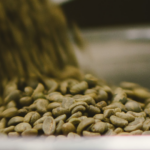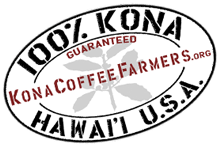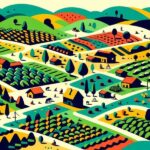The Independent Voice
“Best Agricultural Newsletter in Hawaii”
Newsletter of the Kona Coffee Farmers Association
January 2024
PO Box 5436, Kailua Kona, Hawaii 96745 USA
www.konacoffeefarmers.org info@konacoffeefarmers.org
Contents
Message from President Petersen
Should Coffee Varieties be “Owned”?
There’s a Better Way to Grind Coffee
Is Hand Picking Coffee Actually the Best Option for the Future?
South Korea is a Growing Market for Coffee Products
Why Heritage is So Important to the Coffee Industry
How Long Does Green Coffee Stay Fresh For?
Endless Research into Coffee’s Health Benefits
Finnish Researchers Pushing for ‘Cellular Agriculture’ in Coffee
Kona Coffee Farmers Evolve with Labor Demands and Environmental Concerns
Did you Know? Classified Section on KCFA Website
Coffee Science and Research News of 2023
A Kona Coffee Christmas Poem – Joanie Wynn
Editor – Clare Wilson
Message from President Petersen
Aloha Coffee Farmers,
Hauʻoli Makahiki Hou
As we welcome the New Year, let’s take a moment to reflect on the past one. 2023 was a better year for Kona coffee production and prices than 2022, thanks to everyone’s adaptability, resilience, and passion for good tree health. We also had fun and great learning opportunities as an association, such as the Coffee Farmers Symposium in January, where speakers shared best practices and management challenges with growers. We also hosted several educational events throughout the year, such as workshops, webinars, and a farm research tour, to help us explore and assess our skills and knowledge. And of course, we enjoyed our quarterly potluck gatherings where we shared our farm practices and friendships over delicious food and music. We made our voices heard by lobbying state and federal policy makers on issues that affect our industry, such as truth in labeling, coffee pests and other issues. We aimed to keep you informed of important news or events through our newsletters, website, and email blasts. We hope you found value in being part of this association and we thank you for your support and participation.
Looking ahead, we have some exciting plans for 2024. One of them is the next Coffee Farmers Symposium, which will take place on March 1st. We will send out more symposium details soon but mark your calendars and get ready for another great and informative event. We also want to remind you that we are looking for volunteers for the board next year. This is a wonderful opportunity to get more involved in the association and to contribute to the success of Kona Coffee. If you are interested, please let us know. We would love to have you on board!
We wish you all a happy and prosperous new year. May it bring you more joy, health, and coffee!
Mahalo nui loa!
Mark Petersen
Should Coffee Varieties be “Owned”?
http://tinyurl.com/mt57dey8

“FOR MANY years, coffee varieties have been artificially developed to increase production yields, improve quality, combat plant diseases, and adapt to different environmental conditions.
In September, Nestlé launched a “new and bespoke” coffee variety called N°20. Developed over 20 years of research and development, the hybrid arabica plant is Q-certified by the Coffee Quality Institute (CQI) and is currently being grown exclusively in Colombia for use in Nespresso capsules.
Starbucks also recently announced it has developed six climate-resistant varieties through one of its research and development centres, Hacienda Alsacia, in Costa Rica…”
______________________________________________________________________
There’s a Better Way to Grind Coffee, According to Science
https://coffeetalk.com/daily-dose/top-news/12-2023/101159/
“A team of chemists and volcanologists at the University of Oregon have discovered that adding a spritz of water to coffee beans before grinding can reduce static electricity and create a more consistent, stronger-tasting espresso shot. The study, published in the journal Matter, shows how moisture in coffee beans affects the build-up of charge and how it can be manipulated. The researchers found that friction and fractures result in tiny particles that accumulate electric charge in the process of grinding coffee. The study also sheds light on the burgeoning field of coffee science, which draws together experts from various disciplines to conduct drinkable experiments and probe the fundamental science behind a cup of joe. The researchers suggest that adding a small amount of water to whole-bean coffee beans before grinding can make the coffee more accessible during brewing, resulting in more coffee being brewed…”
Is Hand Picking Coffee Actually the Best Option for the Future?
- Hand-picked coffee is often sold as something beautiful – but the reality can be very different
- It requires five times more workers than harvesting sugar cane – putting a labour strain on coffee farmers
- As seasonal, migrant workers move away from coffee farming, does this make a case for mechanisation?
“FOR MANY, “hand-picked coffee” represents the pinnacle of quality. It gives the impression of a boutique product cultivated and produced with exceptional care.
It is often considered an essential characteristic of specialty coffee – ensuring only the ripest cherries are chosen to achieve the highest quality possible. Research from the Bonga Agricultural Research Centre supports this, showing that selectively picked cherries generally meet higher quality standards than methods that use machinery.
“Hand-picked” certainly has a ring to it…”
USDA Report: South Korea is a Growing Market for US Coffee Products
http://tinyurl.com/2sd63ss4
“South Korea is one of the largest consumers of coffee in the world. According to the South Korean Ministry of Culture, Sports, and Tourism, the coffee market is expected to reach $6.7 billion in 2023, a 50 percent increase from $4.6 billion in 2016.”
“The United States is the largest supplier, followed by Switzerland, and the European Union. In terms of market share, the United States holds 34 percent, while the Switzerland claims 25 percent. Tariff rates on U.S. roasted coffee, coffee husks, and coffee extracts have been phased out since 2016.”
Why Heritage is So Important to the Coffee Industry
http://tinyurl.com/448by57z

- For the 12.5 million farming families worldwide, coffee represents more than just a globally traded commodity
- Coffee farming is often passed down through generations – and producers amass a wealth of local, rural expertise
- Roasters have a critical role to play in communicating, representing, and preserving this
“IN MANY regions around the world, coffee farming has been entangled with communities for centuries. It’s been passed down through generations; serving as a central pillar in people’s lives and livelihoods – becoming a part of their cultural identities.
“For a lot of coffee producers, it’s pride, it’s family,” says Eduardo Choza, director of coffee at Mayorga Coffee. “When that is what you do, that’s what your family has done for a while, it’s inevitable to be part of who you are.”
As such, the coffee they produce holds a significance beyond the product that gets traded and consumed.
“In each cup of coffee, there is a lot of history, effort, and flavours that transmit all the culture that we have, all the things that we believe, and all our dreams,” says Omar Rodríguez, manager of Capucas Coffee Cooperative Limited in Las Capucas, Honduras…”
How Long Does Green Coffee Stay Fresh For?
http://tinyurl.com/2e7wxfuy

“How green coffee is stored is key to cup quality. Good storage maintains the cup profile of a coffee, while poor storage can detract from it.
As such, this is understandably something that specialty coffee roasters take seriously, as do producers and traders.
Like any other agricultural or food product, green coffee has a shelf life. This is how long it can stay at an optimal level of freshness before quality begins to deteriorate. However, improper storage and poor packaging can cause cup quality to “flatten”, and result in a diminished sensory profile in the final cup.
To learn more about how long green coffee stays fresh for, just how important storage is, and how you can keep your green beans fresher for longer, I spoke to a few industry experts. Find out what they said below…”
______________________________________________________________________
Endless Research into Coffee’s Health Benefits Shows a Clear Paradigm Shift
http://tinyurl.com/32pftj2a
- A recent study found that moderate coffee consumption can reduce the risk of coronavirus infection
- Isochlorogenic acid in coffee inhibited coronavirus infection by 43% to 54%
- Two decades ago, coffee was considered unhealthy. This study is the latest in growing body of research proving otherwise
“FROM DIABETES to dementia, drinking coffee has emerged as a preventative measure for a wide range of health conditions. Its impact on reducing the risk of contracting Covid-19 is just the latest.
Recent research published in the Cell & Bioscience journal has shown that coffee consumption can reduce the risk of SARS-CoV-2 (coronavirus) infection. It may even be effective against more complex variants of the virus, such as Omicron.
One of the key biological features of coronavirus, along with many other viruses, is the existence of spike proteins that enable them to enter host cells and trigger infections.
Coffee can prevent coronavirus from entering cells by interfering with the interaction between the virus’s spike protein and the ACE2 receptor – a protein that serves as the entry point for the virus into human cells.
In fact, coffee was observed to significantly inhibit the activity of multiple proteins which are involved in the entry of coronavirus. The research ultimately suggests that coffee can block the virus from entering human cells on multiple fronts…”
____________________________________________________________________
Finnish Researchers Pushing for ‘Cellular Agriculture’ in Coffee
http://tinyurl.com/369v8tzm

Scientists in Finland have shed new light on the process of making, roasting and analyzing lab-grown cellular coffee.
“In a “proof of concept” paper published in the Journal of Agricultural and Food Chemistry today, the researchers present their methods and findings in sharper detail, while further suggesting lab-grown coffee should be explored for commercial applications.
To be clear, the VTT project is focused on providing coffee bio-material for roasting and/or brewing, as opposed to plant breeding.”
_____________________________________________________________________
Kona Coffee Farmers Evolve with Labor Demands and Environmental Concerns
Hawaii Public Radio, November 16, 2023
“During the 2021-2022 season, the state Department of Agriculture reported that the production value of coffee was at almost $62 million.
It’s the second-highest level recorded for the industry, according to the DOA.
However, experts predict this year’s production will decline by about 8%, partly due to labor shortages and a destructive fungus known as Coffee Leaf Rust.”
____________________________________________________________________
Classified Section on KCFA Website
Did you know that the KCFA website has a “Classified” section? It’s a good place to let others know that you sell green coffee, do farm management, or have some items for sale. ![]() Just login to your account and submit your ad for review. If we have a question, we’ll get in touch. Only members may post, but anyone can see the ads.
Just login to your account and submit your ad for review. If we have a question, we’ll get in touch. Only members may post, but anyone can see the ads.
_____________________________________________________________________
Coffee Science and Research News of 2023
http://tinyurl.com/yway269h
from Daily Coffee News by Roast Magazine
“Continuing our Year in Review, we now look back on some of the biggest coffee science and research-related stories of 2023.
It was a particularly abundant year for scholars in the fields of green coffee and sustainability, coffee consumption and quality control, and, of course, coffee and human health.
Here’s our roundup of the biggest stories in each of those areas:
-Green Coffee and Sustainability
-Coffee Consumption and Quality…”
_________________________________________________________
A KONA COFFEE CHRISTMAS POEM
‘Twas the night before Christmas, when out on the farm
The pigs were all snorting and causing alarm,
They’d torn up the lawn and caused damage to trees,
Which was nothing compared to the coffee disease.
“A fungus among us!” cursed old farmer Steve,
“A leaf rust, a menace, it’s hard to believe!”
But that wasn’t all the poor farmer had battled,
CBB beetles had made him quite rattled.
The weeds overwhelmed him, the drought gave a fright,
Each month he slogged through, with no end in sight.
Supply chains were straining, fuel prices rising,
The fact he survived it was somewhat surprising.
The coffee still grew, though somewhat diminished.
Pickers went home, for the harvest was finished.
The cherry all pulped, laid on the deck drying,
A sense of achievement, no matter how trying.
The farmer, so weary, turned in for the night,
Dreaming of coffee not ruined by blight.
Under the covers, tucked tight in his bed,
Dark roasted coffee beans danced in his head.
No visions of Santa or tiny reindeer,
Just hope for a more robust crop without fear.
His dreams were of coffee fields loaded with cherry,
of bags full of green beans, of farmers so merry.
The next morning came with a strong cup of Kona,
Gifts were delivered; FedEx, Amazona.
The farmer would smile and put away strife,
Embracing the joys of his Big Island life.
A happy occasion, a time to rejoice,
With friends and with family, a time to give voice,
To gratitude, fellowship, season of hope,
To fortitude, strength, and the courage to cope.
More fruit was coming, new snow on the trees,
A hearty crop promising bounty and ease.
The yields would be staggering, bigger and better,
The farmer believed that, now more than ever.
Despite all his trials, he truly felt blessed.
He was cheerful and buoyant, no longer stressed.
He grinned and exclaimed as he kicked off his flip-flop
“Merry Christmas to all! And to all a good crop!”
By KCFA member Joanie Wynn, written for her husband Steve Wynn – 2022
________________________________________________________________
KCFA
Like what you read here each month? If you’re not a current member of KCFA, please click here and join us at the Farmer, Supporter, or Business level.
____________________________________________________________________
 Recipes Wanted! If any of you have recipes that you would like to share, please submit them to the editor: clarewilson98@gmail.com
Recipes Wanted! If any of you have recipes that you would like to share, please submit them to the editor: clarewilson98@gmail.com
 LET US KNOW WHAT YOU THINK! >> Write to us. We welcome Letters to the Editor up to 150 words. We reserve the right to edit for clarity and length. Include your name and email address >> Email: info@KonaCoffeeFarmers.org with SUBJECT: Commentary.
LET US KNOW WHAT YOU THINK! >> Write to us. We welcome Letters to the Editor up to 150 words. We reserve the right to edit for clarity and length. Include your name and email address >> Email: info@KonaCoffeeFarmers.org with SUBJECT: Commentary.
 Let us know what you would like to see in our newsletter. Suggestions on what to include or not. What could we do better. Let us know. Clarewilson98@gmail.com
Let us know what you would like to see in our newsletter. Suggestions on what to include or not. What could we do better. Let us know. Clarewilson98@gmail.com




